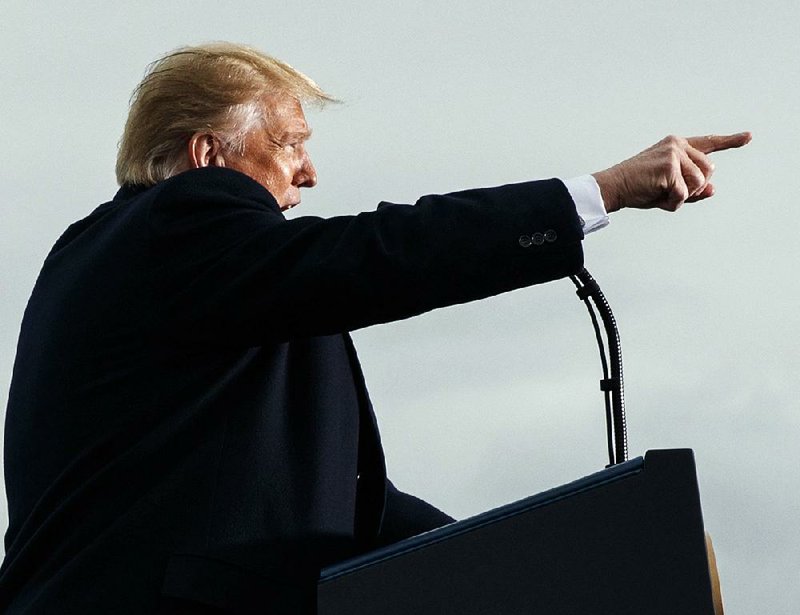WASHINGTON -- President Donald Trump's administration on Friday announced the reimposition of punishing sanctions on Iran, highlighting a hard-nosed foreign policy popular with Republicans and many Jewish voters days before midterm elections.
But the United States will undercut the economic pain intended to hobble Iran by waiving the sanctions on Iranian oil purchases for what Mike Pompeo, the secretary of state, described as eight "jurisdictions."
Pompeo said the eight nations will receive temporary waivers allowing them to continue to import Iranian petroleum products as they move to end such imports entirely. He said those countries, which other officials said would include U.S. allies such as Turkey, Italy, India, Japan and South Korea, had made efforts to eliminate their imports but could not complete the task by Monday, which is when all previously imposed sanctions go into effect.
The waivers will be valid for six months, during which time the importing country can buy Iranian oil but must deposit Iran's revenue in an escrow account. Iran can spend the money but only on a narrow range of humanitarian items.
In a statement issued Friday night, Trump said, "Our objective is to force the regime into a clear choice: either abandon its destructive behavior or continue down the path toward economic disaster."
Pompeo said the sanctions are "aimed at fundamentally altering the behavior of the Islamic Republic of Iran."
He added that he hoped to force changes that give "the Iranian people the opportunity to have the government not only they want but that they deserve."
Pompeo has issued a list of 12 demands that Iran must meet to get the sanctions lifted, which include an end to its support for terrorism and military engagement in Syria, and a halt to nuclear and ballistic missile development.
The final round of penalties targets more than 700 businesses, individuals and other entities involved in Iran's oil, banking, shipping, shipbuilding and insurance sectors. Pompeo and Steven Mnuchin, the Treasury secretary, jointly announced the return of all the previously imposed sanctions in a call with journalists.
Already, oil buyers in Europe, Japan and South Korea have largely eliminated imports from Iran. But China, India and Turkey continue to make such purchases.
Iran's oil exports have plunged to 1.5 million barrels per day from 2.5 million barrels in May, according to administration officials. The economic squeeze has hammered Iran's currency, the rial, which officials and experts say has since lost more than two-thirds of its value.
The penalties were promised in May, when Trump announced that the United States was withdrawing from a 2015 accord with world powers to limit Iran's nuclear program.
The 2015 deal, one of former President Barack Obama's biggest diplomatic achievements, gave Iran billions of dollars in sanctions relief in exchange for curbs on its nuclear program, which many believed it was using to develop atomic weapons. Trump repeatedly denounced the agreement as the "worst ever" negotiated by the United States and said it gave Iran too much in return for too little.
But proponents as well as the other parties to the deal -- Britain, China, France, Germany, Russia and the European Union -- have vehemently defended it. The Europeans have mounted a drive to save the agreement without the U.S., fearing that the new sanctions will drive Iran to pull out and resume all of its nuclear work.
The sanctions seek to force Tehran to end what the United States views as Iran's destabilizing activities in the Middle East, including its support for Hezbollah in Lebanon, Hamas in Gaza and Houthi rebels in Yemen.
Iranian leaders have insisted they have no intention of rewarding Trump's decision to leave the nuclear accord by acceding to his demands or even opening a dialogue; just this week, Danish authorities accused Iran of attempting to assassinate an Arab separatist leader living in Denmark.
Whether Tehran will be able to hold out while its economy suffers is unclear. Iran undertook some of its most aggressive regional moves during the previous round of punishing sanctions between 2012 and 2015.
Some Iran hawks in Congress and elsewhere said Friday's move should have gone even further. They were hoping for Iran to be disconnected from the main international financial messaging network known as SWIFT.
With limited exceptions, the reimposed U.S. sanctions will hit Iran as well as countries that do not stop importing Iranian oil and foreign firms that do business with blacklisted Iranian entities, including its central bank, a number of private financial institutions, and state-run port and shipping firms, as well as hundreds of individual Iranian officials.
"Our ultimate aim is to compel Iran to permanently abandon its well-documented outlaw activities and behave as a normal country," Pompeo told reporters.
Israel, which considers Iran an existential threat and opposed the deal from the beginning, welcomed Friday's announcement.
"Thank you, Mr. President, for restoring sanctions against an Iranian regime that vows and works to destroy the Jewish state," Israeli Ambassador to the U.S. Ron Dermer said in a tweet.
Mnuchin defended the decision to allow some Iranian banks to remain connected to SWIFT, saying that the Belgium-based firm had been warned that it will face penalties if sanctioned institutions are permitted to use it. And, he said that U.S. regulators would be watching closely Iranian transactions that use SWIFT to ensure any that run afoul of U.S. sanctions would be punished.
Information for this article was contributed by Gardiner Harris of The New York Times; and by Matthew Lee of The Associated Press.
A Section on 11/03/2018
